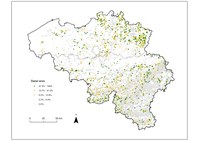ILEE Lunch Seminar
- https://ilee.unamur.be/events/ilee-lunch-seminar-nov
- ILEE Lunch Seminar
- 2018-11-06T12:45:00+01:00
- 2018-11-06T14:00:00+01:00
- Second seminar in November
- When Nov 06, 2018 from 12:45 PM to 02:00 PM (Europe/Brussels / UTC100)
- Where B33 - Biology, 3rd floor
-
Add event to calendar
 iCal
iCal
Presenters
 Sébastien Dujardin (Geography; team of Catherine Linard)
Sébastien Dujardin (Geography; team of Catherine Linard)
RespirIT: Assessing spatio-temporal relationships between respiratory health and biodiversity using individual wearable technology
The BRAIN-be/RespirIT research project aims at better understanding the spatial and temporal effects of plant diversity on respiratory health. By linking the information on the whereabouts and medical condition of individuals to spatially explicit information of plant diversity, air quality and pollen concentrations, it has the ambition to quantitatively, dynamically, and spatially study plant diversity effects on allergic symptom severity.  Yet, spatially explicit information on plant diversity is not readily available for Belgium and ready-made methods to link existing land cover maps to proxies of plant diversity are not available. Within this presentation, we report on the first year’s investigations accomplished to characterise our study area in terms of plant diversity. First, we provide an overview of the forest and plant inventories available for mapping allergenic tree species in Belgium. Second, we expose a spatial modelling approach for mapping allergenic tree species at the national scale. Third, we expose and discuss our main results, including the presence or absence of allergenic trees across Belgium, the spatial distribution of the selected allergenic tree species (Alnus, Betula, and Corylus), as well as their relative share in terms of basal area. Finally, we provide several research outlooks for the next spatial modelling steps, including the use of species distribution models (SDMs) for predicting habitat suitability and abundance.
Yet, spatially explicit information on plant diversity is not readily available for Belgium and ready-made methods to link existing land cover maps to proxies of plant diversity are not available. Within this presentation, we report on the first year’s investigations accomplished to characterise our study area in terms of plant diversity. First, we provide an overview of the forest and plant inventories available for mapping allergenic tree species in Belgium. Second, we expose a spatial modelling approach for mapping allergenic tree species at the national scale. Third, we expose and discuss our main results, including the presence or absence of allergenic trees across Belgium, the spatial distribution of the selected allergenic tree species (Alnus, Betula, and Corylus), as well as their relative share in terms of basal area. Finally, we provide several research outlooks for the next spatial modelling steps, including the use of species distribution models (SDMs) for predicting habitat suitability and abundance.
Lorraine Dewaide (Geology; team of Vincent Hallet)
Hydrodynamic of solute transport in karst conduits with contrasted geometries. The case study of a heterogeneous karst system in the Waulsortian mudmounds (Furfooz, Belgium)
The PhD tackles issues related to solute transport in karst conduits. Precisely, the work focuses on the geometrical control of the conduits on artificial tracer transport. The Furfooz karst system was chosen as case study. It is located in the carbonate mudmounds of the Waulsort Formation (Tournaisian-Visean) of Southern Belgium. In this system, the underground river flows through contrasted geometries, i.e. small conduits vs. underground voluminous lakes. The study consists first in the gathering of field information that are mainly given by the realization of numerous tracer tests on the system. Double-peaked breakthrough curves were sampled downstream the lakes. Hypothesis about the origin of these multi-peaked BTCs are proposed and documented by the tracer tests analysis, and water-level and physico-chemical data. The physical and numerical modelling of the tracer tests are also proposed to dimension the system and verify some postulates. To a smaller extent, the PhD gives a first analysis of dolomitisation/dedolomitisation complex processes that seem related to the karstogenesis of the Furfooz massif.
 Institute of Life, Earth and Environment
Institute of Life, Earth and Environment
